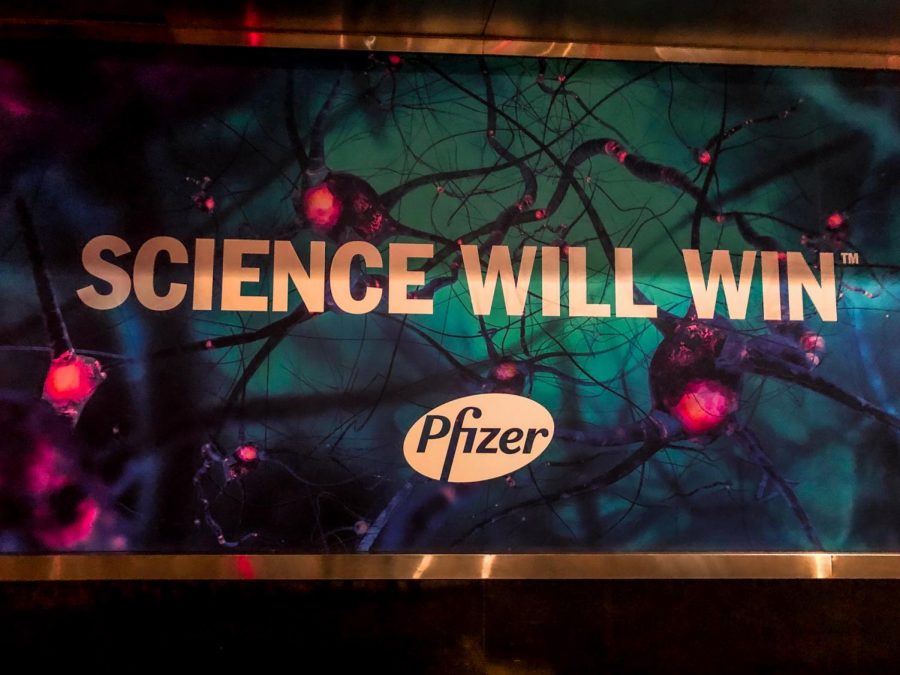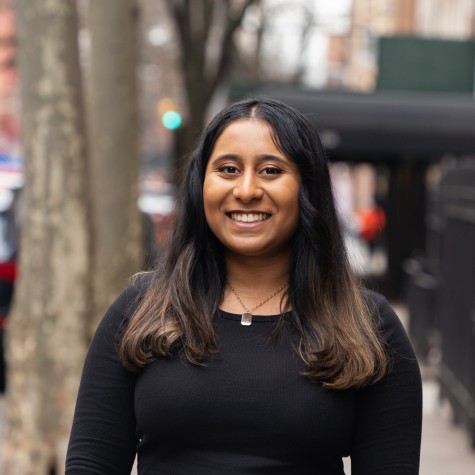International students may be required to ‘mix’ COVID-19 vaccines, despite NYU assurances
Some international students remain hesitant to be re-vaccinated, while others see it as their only path to an in-person education and a post-pandemic college experience.
The New York Pfizer office located in midtown. As international students prepare to come back to the city, concerns arise about potential mixing and matching of COVID-19 vaccinations. (Staff Photo by Roshni Raj)
August 5, 2021
Liberal Studies sophomore Etel Simkina — an international student from Russia — received her first dose of the Sputnik V vaccine in April, before NYU released its vaccine directive. Now, she must be re-vaccinated with an NYU-approved vaccine upon arrival to the United States, or risk losing access to campus facilities and services.
“I don’t have a choice,” Simkina said. “I don’t think it’s a good idea to mix. I definitely do not want to do this, and I have people I know in medicine and they say it’s not a good idea to mix those types, even during a one-year period.”
International students are facing issues with vaccine accessibility due to conflicting guidance, as WSN previously reported. NYU currently requires students to get vaccinated upon arrival at its U.S. campuses in New York City, Washington, D.C. and Los Angeles, irrespective of whether they have already been vaccinated with a non-NYU-approved COVID-19 vaccine. Students from countries assigned a Level 4 travel notice from the Centers for Disease Control and Prevention must also quarantine for 10 days upon arrival.
According to an email sent to students by interim CAS dean Matthew Santirocco on Aug. 3, all students must be fully vaccinated and complete any required quarantine periods by Sept. 15 to attend in-person classes in New York City. If they are unable to do so, students are recommended to make alternative arrangements for the semester, such as studying at one of NYU’s global sites or attending online classes from a remote location.
“What NYU is requiring is that all members of the community be vaccinated with an FDA-authorized or WHO-listed vaccine for the fall; we are not requiring anyone be vaccinated with any other vaccine, or that anyone ‘mix’ vaccines,” NYU spokesperson John Beckman and Executive Lead of the COVID-19 Prevention & Response Team Dr. Carlo Ciotoli wrote in a joint statement to WSN.
However, NYU’s vaccine requirement instructs international students partially or completely vaccinated with a non NYU-approved COVID-19 vaccine — and unvaccinated domestic students — to receive a COVID-19 vaccine authorized by the World Health Organization or the U.S. Food and Drug Administration within 24 hours of their arrival at NYU.
CDC spokesperson Scott Pauley directed WSN to a document titled “Interim Clinical Considerations for Use of COVID-19 Vaccines Currently Authorized in the United States,” which he said shares helpful information for international students trying to fulfill university vaccination guidelines.
“No data are available on the safety or efficacy of receiving a COVID-19 vaccine currently authorized in the United States after receipt of a non-FDA-authorized COVID-19 vaccine,” the considerations state. “However, in some circumstances people who received a COVID-19 vaccine not currently authorized in the United States may be offered re-vaccination with an FDA-authorized vaccine.”
The CDC recommends a minimal interval of 28 days before re-vaccination with an FDA-authorized or WHO-listed vaccine — a protocol also recommended by NYU. Preliminary research on combining COVID-19 vaccine brands in a mix-and-match approach is promising, though they only address “heterologous prime-boost COVID-19 vaccination” — a multi-dose vaccination series in which each dose consists of a different vaccine.
Cameron Murray, an NYU alum and patient coordinator at SHERBER+RAD, a dermatology clinic in Washington D.C., said he and his girlfriend experienced COVID-19 symptoms despite being fully vaccinated with the Pfizer vaccine. He speculated that while being vaccinated protected them from the most severe symptoms of the infection, mixing vaccines may further increase protection against the Delta variant.
“It has really led me to side on the fact that there is a possible benefit to mixing both vaccines, to getting two different types of vaccines, of providing your body different ways of dealing with the virus,” Murray said. “The good work is that the vaccine kills the virus before it can really take over your body and causes you to experience severe and extensive symptoms.”
Cases of the Delta variant are expected to rise in the coming months and peak by mid-October, according to the COVID-19 Scenario Modeling Hub. An internal CDC document, first obtained and published by the Washington Post, notes that the Delta variant is as transmissible as chickenpox.
“The Delta variant is definitely a wild card in this situation because it is much more resistant to the vaccines than the normal SARS-CoV-2 variant,” Murray said. “Research needs to be done on how those vaccines confer resistance to the Delta variant because that is becoming the realest threat at this moment.”
Sputnik V, in addition to Covaxin — a vaccine developed and administered in India — are not NYU-approved vaccines. A combination study on mixing the Sputnik V and Astrazeneca vaccines is set to begin this year, but is not expected to end until March 2022.
“There is a lot of skepticism around the Sputnik vaccine or any other Russian vaccines circulating right now, as far as I know,” GLS senior Nastya Guzenko said. “Nobody knows what’s in the vaccine, and I think that’s causing a lot of skepticism because people just don’t know what to trust and what not to trust. But also on the other side, I’ve heard many good stories about Sputnik and how it might have saved someone’s life.”
Students who have received one dose of a multi-dose FDA- or WHO-approved vaccine will be allowed on campus as long as they submit proof of their second dose within 5 days of vaccination and participate in ongoing testing until two weeks after the second dose. If students decide not to be re-vaccinated, consequences may include de-enrollment from NYU courses, being evicted from residence halls, not being able to enter NYU academic and administrative buildings and a deactivated NYU ID.
Varvara Rodionova — an LS first-year from Russia — originally planned to wait and get a WHO-approved vaccine, but the thought of mixing vaccines has crossed her mind.
“They didn’t give much information about how safe it would be, but to be honest I’m not too much concerned about that at this point,” Rodionova said, referencing how she would prefer an in-person education. “Recently, I’ve been thinking to just get vaccinated twice, first by any Russian vaccine, and then probably by any American vaccine. But right now, I don’t even think I have the time to get vaccinated twice before the start of the [academic] year.”
After flying out of Russia, Rodionova plans to get vaccinated in Cyprus before going to NYU Florence, as NYU has not yet contacted her about possible alternatives.
NYU states that it will grant appropriate medical and religious exemptions from receiving the COVID-19 vaccine. Virtual class accommodations will also be provided for students facing visa, quarantine and travel restrictions.
Although Guzenko is a Russian citizen, the CDC guidelines followed by NYU did not allow her to study away last autumn through NYU’s Go Local program in Berlin. NYU’s study away sites cater to certain fields and subjects, and Guzenko planned her academic schedule around GLS and psychology classes offered at NYU Berlin.
“I feel like this situation has just shown how much the US citizenship means and how large of a role it actually plays,” Guzenko said.
While Murray encourages everyone, especially young people, to get vaccinated, he does acknowledge the ethical debate of studies showing that mixing vaccines can result in a higher propensity to experience more robust negative symptoms.
“The results of that research showed that more potent symptoms are possible through mixing vaccines, then that becomes even more concern on that side, especially when you’re talking about universities like NYU mandating that international students get a federally regulated vaccine,” Murray said. “But you potentially gain a higher degree of resistance, and I think that’s important. It really depends on the negative effects that are experienced by individuals mixing vaccines, and we don’t know exactly what those symptoms are yet.”
Contact Roshni Raj at [email protected].




























































































































































